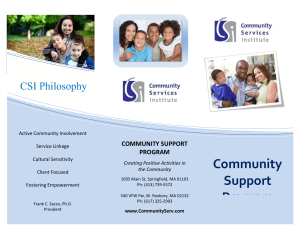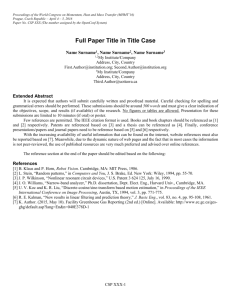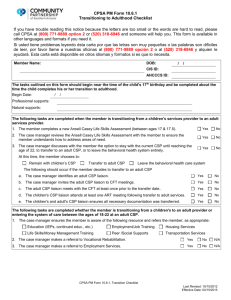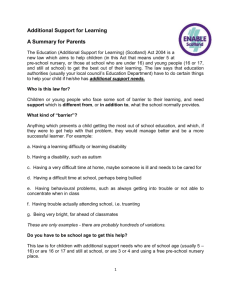faq - Vermont Family Network
advertisement
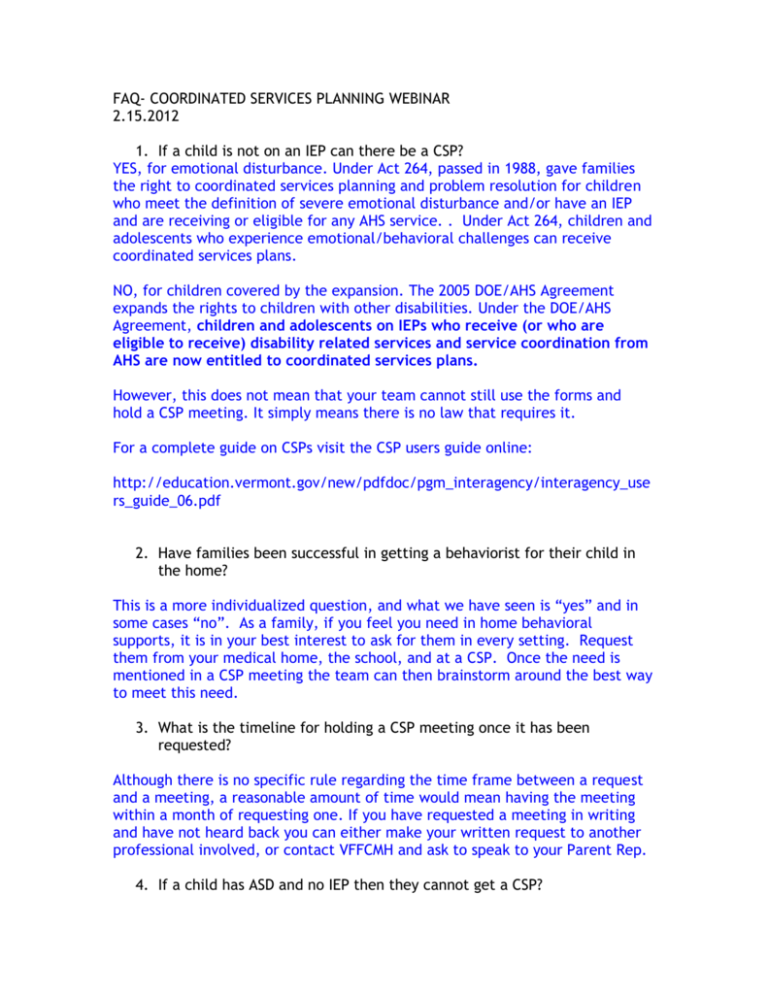
FAQ- COORDINATED SERVICES PLANNING WEBINAR 2.15.2012 1. If a child is not on an IEP can there be a CSP? YES, for emotional disturbance. Under Act 264, passed in 1988, gave families the right to coordinated services planning and problem resolution for children who meet the definition of severe emotional disturbance and/or have an IEP and are receiving or eligible for any AHS service. . Under Act 264, children and adolescents who experience emotional/behavioral challenges can receive coordinated services plans. NO, for children covered by the expansion. The 2005 DOE/AHS Agreement expands the rights to children with other disabilities. Under the DOE/AHS Agreement, children and adolescents on IEPs who receive (or who are eligible to receive) disability related services and service coordination from AHS are now entitled to coordinated services plans. However, this does not mean that your team cannot still use the forms and hold a CSP meeting. It simply means there is no law that requires it. For a complete guide on CSPs visit the CSP users guide online: http://education.vermont.gov/new/pdfdoc/pgm_interagency/interagency_use rs_guide_06.pdf 2. Have families been successful in getting a behaviorist for their child in the home? This is a more individualized question, and what we have seen is “yes” and in some cases “no”. As a family, if you feel you need in home behavioral supports, it is in your best interest to ask for them in every setting. Request them from your medical home, the school, and at a CSP. Once the need is mentioned in a CSP meeting the team can then brainstorm around the best way to meet this need. 3. What is the timeline for holding a CSP meeting once it has been requested? Although there is no specific rule regarding the time frame between a request and a meeting, a reasonable amount of time would mean having the meeting within a month of requesting one. If you have requested a meeting in writing and have not heard back you can either make your written request to another professional involved, or contact VFFCMH and ask to speak to your Parent Rep. 4. If a child has ASD and no IEP then they cannot get a CSP? Although children now eligible through the expansion must have an IEP to qualify for a CSP, many of the challenges related to ASD are emotional or behavioral in nature. Because of this you can make the case that children with ASD should be able to receive a CSP. Refer back to the answer for question #1. 5. Can children under 3 have a CSP? Typically a child under the age of three would have a CIS plan to meet their needs. A CSP would come into place after the age 3, or sometimes 6. 6. Does having a positive experience in the process differ from region to region? This process is like any other process; whether the process is successful or not is not necessarily region specific. It is very similar to IEP processes; there are good experiences and bad experiences in very region, in every team. A team that has a successful experience with one family can fall apart for another. This is why the role of the Parent Rep is so important. Having a person knowledgeable in the system, and with personal experience, to support the family, can change the dynamics of a meeting. There are experienced facilitators in every region, and it may be the first time a person is facilitating the CSP process for you. The outcome it not really based on the facilitator, it is based on the teaming process during the meeting. 7. Can a CSP help a youth who is going to court or convicted of a crime? There is no legal reason to have a CSP in this situation. Having said that, it certainly cannot hurt for the people involved in keeping a young adult out of jail, or helping them transition back out, to all be on the same page regarding how to best help the youth. Keep in mind that for it to be an official CSP, the youth would need to meet the definition of emotional disturbance, or the requirements of the expansion. Unofficially, you could have the meeting and use the forms; there would simply be no legal right to coordination. 8. Who else qualifies for a CSP in addition to SED students? Under Act 264, passed in 1988, gave families the right to coordinated services planning and problem resolution for children with emotional disturbance. Under Act 264, children and adolescents who experience emotional/behavioral challenges can receive coordinated services plans. The 2005 DOE/AHS Agreement expands the rights to children with other disabilities. Under the DOE/AHS Agreement, children and adolescents on IEPs who receive (or who are eligible to receive) disability related services and service coordination from AHS are now entitled to coordinated services plans. This includes: A. learning impairment; B. specific learning disability of a perceptual, conceptual, or coordinative nature; C. visual impairment; D. deafness or hard of hearing; E. speech or language impairment; F. orthopedic impairment (result of congenital anomaly, disease or other condition; G. other health impairment; H. emotional disturbance; I. autism; J. traumatic brain injury; K. deaf-blindness; L. multiple-disabilities; M. developmental delay (applies to children ages 3 to 5 years 11 months). 9. Does a CSP go beyond high school and into college? Up to the age of 22 10. Are students on 504 plans required by law to have a CSP? NO 11. What do you mean by an extended plan? Refer to question #1 12. Should lead agencies have parent sign consent forms for CSP prior to the meeting to allow time for them to contact the parent rep and to prepare? Ideally, parents should be given the opportunity to ask for a parent rep before the actual meeting. What we suggest is that when teams are first setting a date for the CSP they explain to the parents what the role of the PR is. With that information the parents can decide whether or not they would like to meet with the PR before, during or after their CSP. 13. Who determines the lead agency? If the child is in DCF custody, by law, DCF is the lead agency. They can have another agency facilitate the meeting if they chose. If the child is not in DCF custody, the lead agency would be the agency who knows the family and child best. Keep in mind that being the lead agency simply means that you are facilitating the meeting, not that you are responsible for paying for services. There also might be a situation in which the agency that knows the child/family best is not the place where the majority of issues are happening. In that instance it might be a school who is the lead agency even though most of the issues are MH related 14. Are schools required to direct parents to parent reps? By law, a parent must be notified of their right to a parent rep when a CSP is being created. However, keep in mind that many people do not know of this requirement. In addition, the forms themselves can make it difficult to facilitate a connection between families and PRs, as some teams are already in a meeting before they inform a family. The Interagency Team has been working diligently to ensure that more people are aware of a family’s right to a PR. 15. If a family had a CSP before, services provided, and yet the family is sitting at the table again, should some of the original CSP members be brought back to the table, even if the family lives in a different town? As a family member you can invite whomever you want to the meeting. It makes sense to have the people you feel know your child the best, attend the meeting. This might prove challenging due to the limitations of the school personnel and the staff at the designated agencies. 16. What if two children in the home require services? Then each child should or could have a CSP if eligible for one. There would probably be some overlap in services and depending on what the family wants, you could have 2 individual meeting or try having one large meeting to complete both CSPs at once.
